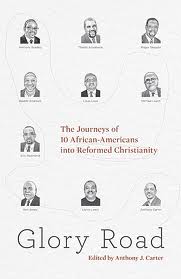Reading Reflection

July 25, 2012
 In case you haven't been on my blog this week, neither have I! I'm on vacation. This re-run is from back in October. I picked this one because it inspires us to disciple!
Glory Road, Edited by Anthony Carter (Crossway, 2009)
The subtitle to this book is, The Journeys of 10 African-Americans into Reformed Christianity. This is a topic that I have been interested in lately, so I bumped it up a couple of notches in my “books to read” pile. Something about the cover design is appealing to me as well: little mini, black and white computer-generated portraits of these 10 well dressed African-Americans. Softly interrupting the crisp black and white design is a gray line that looks like someone just freely marked it with a pencil, over and under the portraits, until it makes its way to the end of the subtitle—Reformed Christianity. That phrase is circled three times almost with a scribble.
As I opened the book, the dedication hit me as a little strange:
In case you haven't been on my blog this week, neither have I! I'm on vacation. This re-run is from back in October. I picked this one because it inspires us to disciple!
Glory Road, Edited by Anthony Carter (Crossway, 2009)
The subtitle to this book is, The Journeys of 10 African-Americans into Reformed Christianity. This is a topic that I have been interested in lately, so I bumped it up a couple of notches in my “books to read” pile. Something about the cover design is appealing to me as well: little mini, black and white computer-generated portraits of these 10 well dressed African-Americans. Softly interrupting the crisp black and white design is a gray line that looks like someone just freely marked it with a pencil, over and under the portraits, until it makes its way to the end of the subtitle—Reformed Christianity. That phrase is circled three times almost with a scribble.
As I opened the book, the dedication hit me as a little strange:
To R.C. Sproul. When God inspired 1 Corinthians 15:58, we believe he had men like you in mind.Huh? Here we have 10 African-Americans dedicating their testimonies to a 72-year-old white guy from Pittsburgh? I guess I expected a really cool black name that I couldn’t pronounce, like Thabiti Anyabwile (one of the book’s contributors). You know, some father figure in their life who pointed them to their African-American roots in the Reformed faith. While I wasn’t disappointed later in the book to see these men mentioning some black reformed names they discovered later in their journeys, R.C. is a thread woven through each story in the book—just like the pencil marking on the cover. That’s when I realized that R.C. Sproul is the Kevin Bacon of Reformed theology. Except I don’t think it takes six degrees of testimony for any of us who discovered the doctrines of grace later in our Christian upbringing to make a connection to a role Sproul played in it. I knew his books were pivotal in my own theological awakening from dispensationalism to reformed, covenantal theology. But I always felt like mine was an isolated experience in which God just happened to use an older, unassuming man to teach me something amazing. Apparently, these African-American guys had some similar experiences to my own. Now I don’t want to mislead you into thinking that this book is about R.C. Sproul. It certainly isn’t. It is about the sovereignty of God in salvation and sanctification. Through their testimonies, these men share their experiences in mainly black churches, and many of their hard decisions to either leave or try to transform them. Most of these men were viewed by the people they loved and grew up with as turning their backs on their culture and heritage. And yet, they all share a passion to glorify God in teaching their black communities the Reformed faith. But several of these guys noted something that I perceived while reading their stories: this lack of theological substance and preaching of the gospel was not just a black-thing. It is a problem in the evangelical culture as a whole. This is where Sproul comes in. The plain-speaking, uncharismatic, yet passionate writings and talks of this man have captured all of us who were left hungry for the whole truth of God’s word. He didn’t set out to reach specifically the black community, but the whole schlew of us who grew up in the evangelical backsliding from the doctrines of grace. And so it was for Michael Leach, who stumbled upon a Tabletalk publication while he was ministering to inmates in prison. He was so captivated by its theological content that he took it home with him. Or, Anthony J. Carter, who found a vintage video tape of Sproul while cleaning outdated material from a storage room. It is simply amazing how God has used the writings and teachings of this man. And there are many more like him who these men read or heard in wonder. Maybe those of you who grew up in the Reformed faith take the doctrines of grace for granted. But those of us who hear it for the first time through these materials are so grateful for the treasure we have found. God’s grace in bringing these people to our lives leads us to want to do the same for others. Even today, black men in the reformed church are a minority. Sometimes I feel the same way about housewife theologians. May God use us all, even if just a portion of how he has used his servant R.C. Sproul, so that others will be blessed by his overwhelming mercy and grace.




